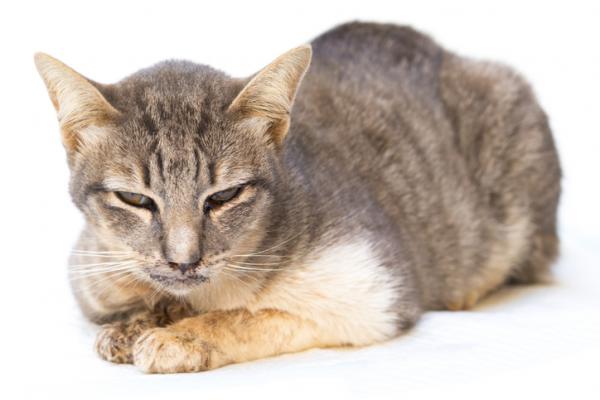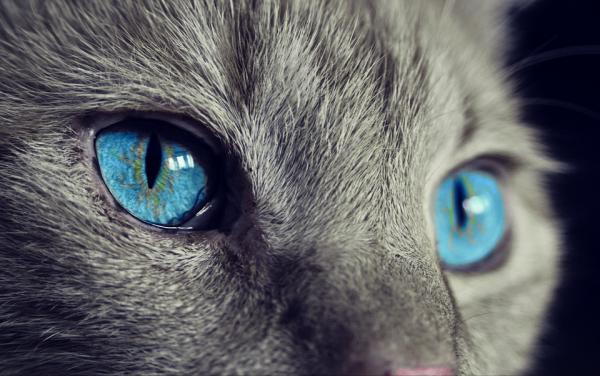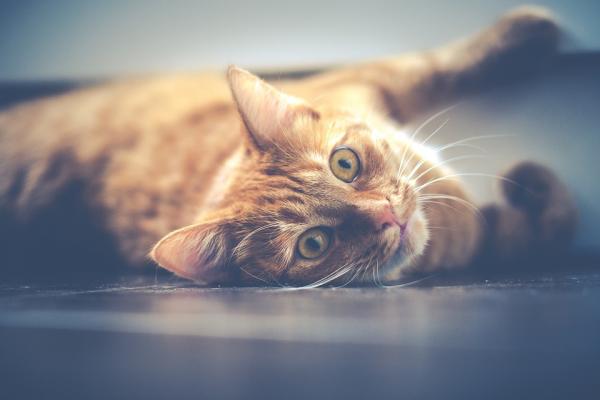Feline herpesvirus – Symptoms and treatment

We know that the most important thing for you is the health and well-being of your pets, because you understand the responsibility of adopting a furry companion and the care and affection that you must provide to grow up to be a happy and healthy animal. That’s why we want to provide you with more detailed information about everything that can happen to your furry, so this time we’ll talk about feline herpesvirus, its symptoms and treatment, a disease very common in cats.
It is important to go to your veterinarian before any unusual symptom or behavior for what it tells you what to do, it could save your cat’s life.
What is feline herpesvirus?
Feline herpesvirus (FHV-1) is a virus responsible for most cases of feline flu. It belongs to the same family of feline calicivirus, and like this it is characterized by the existence of different strains that mutate, causing the disease to occur in different degrees of intensity.
The FHV-1 causes the development of a respiratory disease called feline rhinotracheitis, although it also brings with it the appearance of various ocular diseases that can generate sequels for life.
In case of any of the symptoms mentioned below, immediate visits to the veterinarian and compliance with their instructions are recommended, as careless treatment or taking the pet too late to be diagnosed can lead to the development of bacteria in the eyes, bringing complications in the recovery or causing the total loss of vision, and even of the eye.

Contagious feline herpesvirus
Feline herpesvirus it is transmitted directly through sneezing, tears and the mucous of an infected cat, not only by being close to the healthy cat but also by means of feeders, sanitary beds and toys that the sick animals share with the healthy ones.
Although it is not transmitted to humans, if a person handles a sick cat and then does not take the necessary hygienic measures (which include disinfecting and changing clothes), it is possible that spread to other felines through the cloth.
The infection can be contrary to remain without manifesting for months or years, appearing the symptoms when the animal goes through moments of stress, which as we know are very common in cats when changes in their routine. However, this occurs only with the 15% of infections.
Which animals are more likely to contract it?
Although there is a vaccine, this does not completely prevent the animal from contracting the virus, due precisely to its mutability. However, reduce this possibility.
The situation of some animals makes them more susceptible to catching feline herpesviruses, such as those found on the street, domestic cats that lead a life outside and animals with a tendency to develop eye diseases. Also, the offspring can be infected if the mother is a carrier.

Symptoms of feline herpesvirus
Be attentive and go to the veterinarian if they have the following symptoms:
- Sneezing
- Trouble breathing
- Secretions in one or both eyes
- Fever and malaise
- Anorexia
- Tearing
In newborn cats, it can occur neonatal ophthalmia, that is, inability to open the eyes. The disease can be aggravated by the development of keratitis (ulcers), synechia (the union of the iris to other parts of the eye) and corneal sequestration (appearance of a black layer on the cornea).
Diagnosis
Usually, the symptoms are enough to confirm that you are facing a case of feline rhinotracheitis. They are also made Lab tests with the blood, saliva and tears of the animal to be one hundred percent safe.

Treatment of feline herpesvirus
Being a viral disease, in infectious agent is lodged in the cells of the host (in this case, the feline), so the treatments should be focused on eliminating the virus without affecting the cells of the animal.
In the case of feline herpesvirus, the success of the treatment lies in strengthening the animal’s immune system so that the body can discard the virus. They are prescribed antivirals, antibiotics and anti-inflammatories. This not only alleviates the discomfort of the cat, but it also fights the virus and prevents possible secondary infections that could aggravate his health. Equally important are medications that keep mucus in line, the obstruction of the nose and the functioning of the lungs.
La hydration It is crucial, either at home or at the veterinary clinic, depending on the patient’s condition. Also, it will be necessary to assist the cat in its cleaning, using a soft cloth to remove delicately the secretions of the nose, eyes and mouth.
The diet should not be neglected. If tempting your pet with your favorite food does not work, you should resort to assisted feeding using a syringe and liquid food.
If there are other cats in the house, the infected animal must remain isolated of them to avoid getting infected. Similarly, disinfect spaces and utensils with which you have contact, applying effective cleansers that do not cause harm to the animal.
The person in charge of caring for the sick animal should change clothes and wash hands and face very well before coming into contact with other healthy cats in the environment.

Aftermath
In some animals, infection with feline herpesvirus can bring long-term sequelae. With regard to eye diseases, it is possible that they appear scars on the cornea or cause the opacity of it; inclusive, the vision can be affected by a constant tearing. The other diseases that we point out as complications when we talk about the symptoms can also appear.
In addition, these animals usually remain as carriers for the rest of their lives: whether they relapse or not in the disease, they will be contagious agents for the other felines around them.
Prevention of feline herpesvirus
The most important thing is to follow the cat vaccination schedule from puppy and repeat the reinforcements of the dose every year, this reduces the chances of contracting the disease and, if necessary, mitigate the seriousness of it.
Take the necessary hygiene measures When you have a sick animal at home, in a shelter or in a residence, to prevent the outbreak from spreading to the rest of the cats and becoming an epidemic.
This article is merely informative, in .com we do not have the faculty to prescribe veterinary treatments or make any kind of diagnosis. We invite you to take your pet to the veterinarian in case of any type of condition or discomfort.
If you want to read more articles similar to Feline herpesvirus – Symptoms and treatment, we recommend that you enter in our section of viral diseases.


